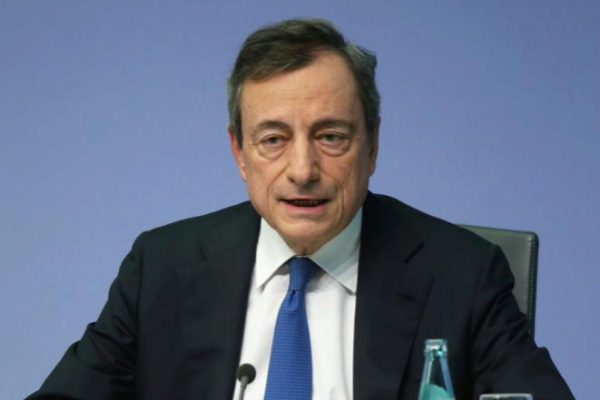- ECB: Goodbye to the wizard of the Eurozone: Mario Draghi and the miracle of the euro
The Governing Council of the European Central Bank (ECB) has decided at the meeting this Thursday, the last one chaired by Mario Draghi, leave things as they are, following the recommendation of the economic team and waiting for the landing of Christine Lagarde , who attended as a listener to the deliberations.
On this occasion unanimously, the Board decided to maintain the interest rate at which it lends to banks weekly at 0% and the rate to deposits (marginal deposit facility) at -0.5%. The marginal credit facility, to which it lends to the banks at one day, was also unchanged at 0.25% and unanimously respected the answered decision to restart debt purchases on November 1 at a monthly rate of 20,000 million euros , as decided in September.
"Unfortunately, everything that has happened since September has proved in excess that the determination of the Governing Council to act was legitimate," Draghi said Thursday in Frankfurt. In his last press conference as president of the ECB, and more relaxed on previous occasions, Draghi has warned that his departure will not mean a radical change in monetary policy, as some members of the Eurozone, especially Germany, would like.
Economic indicators show "significant downward risks of growth in the Eurozone for a long time and inflationary pressures remain weak," he said.
Objective: inflation
Draghi leaves without having fulfilled the main objective of the ECB, which is to ensure that the level of inflation is below but close to 2% in the medium term, and in fact inflation has been below 2% three-quarters of his mandate as a result of the sovereign debt crisis of 2011.
For the Italian banker, the goal was to save the euro with all the measures that were necessary to take and as the ECB said in its famous speech in London, it had enough.
"I leave the presidency of the ECB with the conviction that the Governing Council and I take the measures that we consider necessary at all times and always according to our mandate. If there is something I am proud of it, we have always We have fulfilled our mandate. We never give up, "Draghi said that, on a personal level, it takes a" very interesting and fascinating "experience. On what he will do in the future, he summoned the media with a smile to ask his wife: "She sure knows or I hope so."
Draghi did not comment on the room for maneuver he leaves behind his successor and avoided giving him advice, since Christine Lagarde is "very capable and has plenty of time to learn and make his own opinion of the Governing Council." Nor has he valued the criticisms he has received from all sides for his expansive policy, especially from Germany but also from the governors of other central banks, contrary to the resumption of bond purchases. It was enough to remember that "central banks are independent but interdependent in the euro zone," that is, the monetary policy of the ECB must take globality into consideration.
8 year balance
The departure of Draghi, " Super Mario " for some, "the man who saved the euro" for others and for the Germans " Draghila " for sucking the savers' blood with their zero interests, does not occur as it would have been desirable in a normal environment. "We tried to prepare the departure of all unconventional measures in 2017, but we had to change course in the face of economic indicators," Draghi confessed by putting his management in perspective.
What was the biggest mistake of your management? He doesn't know, nor think about it. "I only put the focus on what can be done and not on what can be changed. The past is a matter for historians," he said.
Draghi always looks to the future and what he sees is that official interest rates will continue at current levels or at lower levels until he observes a solid convergence of inflation outlook to a level close to, although below, 2%.
"The ECB has an excellent team of economists and we know that negative interests for a very long period can have negative effects, but the situation is constantly monitored," said Draghi, for whom the threat is not in the interests but the weakening economic.
And as a final warning, he has reiterated the call to governments to apply half fiscal measures that complement the monetary policy action in order to boost growth and improve public finances. "Governments with fiscal space must act effectively and in a timely manner. In countries where public debt is high, they must follow prudent policies and meet the objectives of structural balance," Draghi reiterated. At European level, he appealed to conclude the banking and capital union.
With a period of economic weakening prolonging the uncertainty about the effects of undispersed Brexit and open commercial deputies, analysts do not foresee a change of course in the ECB from November 1, when Lagarde assumes the presidency.
"The Frenchwoman has supported Draghi's monetary policy and as a former finance minister she will show understanding for the wishes of her former highly indebted colleagues in the South. Her policy will be equally lax," says Commerzbank chief economist Jörg Krämer .
According to the criteria of The Trust Project
Know more- Macroeconomy
Finance Half of the big banks in the eurozone would not survive six months in a liquidity crisis
InterviewIain Stealey (JP Morgan): "The elections will not change the trajectory of the Spanish economy"
Resignation Sabine Lautenschläger: another casualty of Germany against Draghi's policy at the ECB

